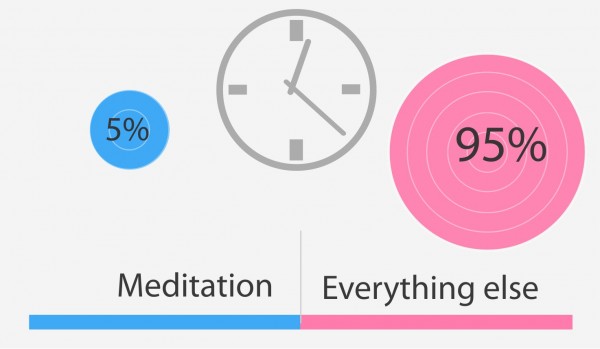I don’t have time to meditate, do you?
I make do with 15 minutes of sitting here and there: in the train, or before leaving for work. It’s all I can to keep practicing, and that’s not nearly as much as I’d like, especially when my schedule gets insane like now.
Sometimes I regret my monastic days, when practicing was a given, a requirement, a necessity. Now, each break is a luxury and I can’t always afford it.

But reality has two faces (sometimes many more), so even if time shortage is frustrating, there’s a bright side to it: you learn to appreciate it, and you often use it right.
Once you’re reduced to squishing your practice in a 10 minutes slot everyday, you give it your all, which doesn’t happen on a monastic schedule with dedicated periods of time.
I used to live among hardcore meditators, and many of us had the same problem: we would easily lose focus and interest in meditation, I guess it would be the same thing if you could watch Netflix all day long without worrying about money: you’d end up staring at the window.
Also: putting yourself in a lifestyle where meditation is a must can degenerate into performance anxiety: worrying about not doing enough, getting competitive with your peers and sometimes frankly neurotic.
So I’d like to share a little message of hope for all those who live under the gun and have too little time to enjoy sitting on their own and watching their mind: you might not be able to practice formally, but:
- You’re more likely to do it with gusto
- You have more drive to leverage everyday circumstances to practice.
That’s assuming you abandon the simplified definition the west gave the word “meditating”. Meditation is not merely about sitting with a straight back, focusing on a support. According to the Buddhist masters I heard, it means much more than that:
The Tibetan word for meditation “Gom” means “to become familiar with” and has the strong implication of training the mind to be familiar with states that are beneficial: concentration, compassion, correct understanding, patience, humility, perseverance, etc -1
All right, I’m aware that this kind of statement is disappointing when you expect formal practice to be an exotic toolchest of colored visualisations and breathing exercise, but the reality is more down to earth, and also more accessible than we think. Compassion, ethics, love, patience are part of the program that makes you a better meditator and in the same way, meditation is a useful resource if you wish to be more compassionate, loving…You see where I’m going.
So how to meditate all the time? It becomes obvious when you realize that meditation is mostly about training your mind, day and night to become a better person.
That involves:
- Stroking the cat when he asks for it
- Understanding a stranger’s despair and wishing her well
- Identifying everyone else’s defects as your own, and making peace with that
- Accepting that you’re not perfect and that at least…you’re trying
- Sitting on a cushion and watching whatever your mind is doing, and then try to carry this mindset everywhere with you.
In the end, how we meditate reflects how we live, and vice versa. I’d call that a virtuous circle.